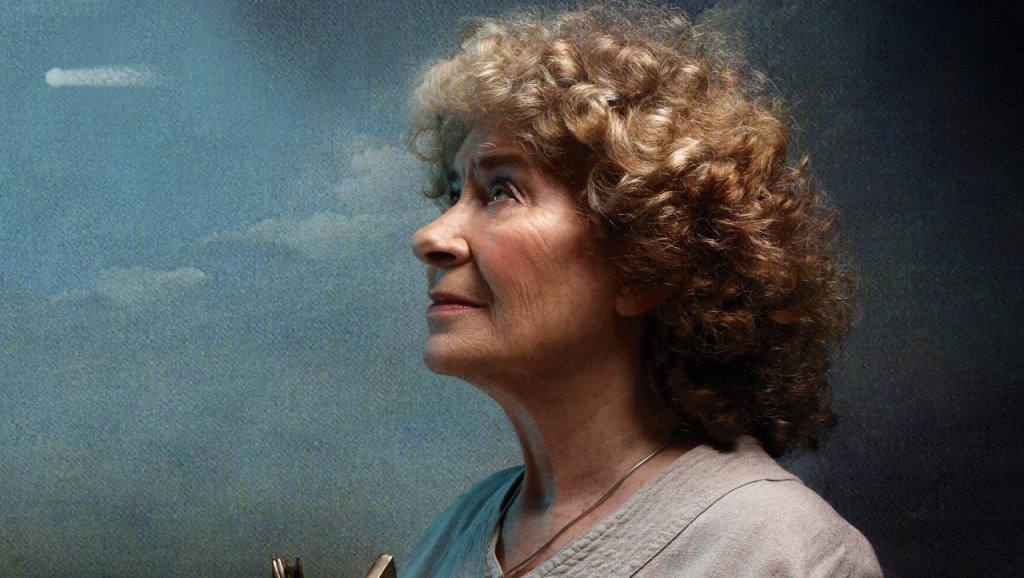Returning to the world of music with Lodestar, her first album in 38 years, British folk legend Shirley Collins has finally emerged from every singer’s greatest nightmare. Losing their voice. Diagnosed with a form of dysphonia in the early ’80s, Collins was unable to sing for almost four decades, having to take day jobs working in shops or job centres to support her family and leaving her career as a singer behind.
Rising to prominence in the ’60s as part of the British Folk Revival, Collins was one of the leading artists of the movement. Not only a singer, she was also an avid song collector, traveling all over Britain and even to the U.S. to record folk singers and document the fast disappearing songwriting traditions passed down from troubadour to troubadour. Striking her down in her prime, her dysphonia however never diminished her love of the music and the songs.
Remaining active in the folk community by giving talks about the songs and presenting the field recordings she and others had made, the community never forgot her. With her music continuing to be released, musician and founder of apocalyptic folk band Current 93, David Tibet got in touch and over a 20 year period slowly coaxed Collins back into the limelight.
It was during one of these cameos that Collins caught the eye of Domino Records who offered her the chance to get back into the studio and record an album. The result is Lodestar, a collection of British, American and Cajun folk songs dating from the 16th century to the 1950s. Alternating between brooding and beautiful – and at times balancing in-between – the album is a stunning testament to the fact that it’s never too late to do anything.
Music Feeds: How does it feel to be singing again after 38 years?
Shirley Collins: It seems impossible doesn’t it. Although I’d stopped singing, I just couldn’t manage to sing at all, I was still doing talks about the music and people would always be asking me to come back and sing again. And I’d always say “oh no I can’t do it.” But there were two people who kept my profile in the public gaze, David Suff of Fledg’ling Records who just kept releasing old records and unreleased EPs of mine from the ’60s and David Tibet the musician, who apparently 20 years ago phoned me up one day and said “look I really love your music, can I come and see you?” And he told me a couple of weeks ago when we met up that when he said that to me I burst into tears and I said to him “oh I thought I’d be forgotten.”
And so he made it his mission for a quite a while to get me signing again. He kept asking me if I’d just appear at shows of his, and sing one or two songs. I kept saying no, but he just kept asking until I said yes. Then when it came to it I backed out because I was too nervous or too scared, but he kept asking and then finally one day I actually went and did it. So it all stemmed from there really. I found enough confidence to put myself out there in front of an audience again as a singer. It was well received and people were very kind, and then Domino records came along and invited me to make a whole album and I said yes.
We took it really slowly. We recorded over the whole of spring and last summer, and all in my cottage so that I felt really comfortable, and Lodestar is the result. I’m just so happy to have done it finally, it’s just such a breakthrough.
MF: It must be amazing to be able to do what you love again after thinking you might never have the chance again.
SC: It really is. I love this music so much and I loved singing it and just felt like I was another person when I wasn’t able to do it. But here we are, back again and what I’ve realised from doing this is that it’s never too late to do anything.
The whole process of recording was wonderful. There were tense moments of course when I was cross with myself because I couldn’t sing or something, but it was all done in my cottage in Lewes so it was all very informal and all the musicians I chose were friends who I knew and whose music I loved and who I could trust with the songs and trust not to look at me and think “oh lord she can’t sing.” They were just so supportive and Ian Kearey who was the music director was just wonderful because he kept me going. And there were a lot of laughs along the way too. So it was a very happy thing to do and now we’re just waiting to see how it’s going to be received.
MF: Losing your voice like you did must be the greatest nightmare for any singer. Can you tell us what it was like going through that?
SC: It was just absolutely dreadful. You’re not the person you once were when this happens to you. And I did try to continue to sing after this first happened to me but I was just letting myself down all the time. My voice wasn’t reliable, and it was humiliating when it would fail me in front of an audience. Also I’ve just got so much love for the songs and I didn’t want to let the music down either.
I had two children that I had to bring up and I just had to look for other jobs to support them, and that went on for far too long. So it’s just such a bonus at this point in my life now to be able to get back to it once more and be able to say “I’m Shirley Collins and I’m a singer” instead of saying I work in a shop, or the job centre or whatever. So it’s miraculous to me and I’m just so grateful.
MF: And I imagine at this point your children are grown up and you’re free to throw yourself entirely back into the music?
SC: Oh yes, I’ve got grandchildren now, and I’m having to support them. They’ve come to a couple of talks too, and we’re planning a small run of shows for next year and they’ll definitely come to those. One of my grandsons is actually studying music as well, and the other is a cricket player which I’m very happy about because I love cricket, so they’ve turned out well.
MF: Can you tell us a bit more about the process of getting your voice back to where you are comfortable singing again?
SC: I treated myself quite gently, and I used a lot of honey which I would put in special tea that I have that is good for your voice and I’d eat a lot of ice cream, so it was quite nice. I recommend it to anybody.
And it was absolute pleasure getting back to recording, because, as I said, we could really take all the time that we needed and I was surrounded by friends. We actually hit a stroke of luck while recording the song called Cruel Lincoln. It was a very hot day and all the windows were open and at the back of my garden there is a great big bank that has masses of trees and bushes and shrubs on it that are crammed with birds. And on the day that we recorded the song, the birds were singing so loud they even got picked up on the microphones. So we listened to the playback and we heard the birdsong and we all just said “we have to keep that on.” And it’s there, and it just provides the beautiful natural backdrop to the horror of the story being told in the song.
MF: Having not been able to sing for so many years, has it affected at all the way you approached or appreciated the music?
SC: I’ve always loved it anyway and even when I wasn’t singing I was still listening to the music and I was still learning songs. You know if you love something and you play it over and over again it just goes in.
But I was once a carefree singer, I could just open mouth and sing and it was easy to do, whereas now I have to really think about what I’m doing. So there is more intensity I think, without being too dramatic about it, just because I am thinking about the words so much and I’m just really grateful I’m singing again. It’s transformative.
MF: With such a long absence did you struggle at all to pick the songs when it came time to put the album together? I can imagine you had a lot of songs you would have loved to include?
SC: Yes, and the trouble is I’ve got quite a few songs I want to sing that I haven’t recorded yet. So hopefully this does well and I can get another dozen or so songs together that I love out there and into the world.
But the songs that made it on the album are songs that had always fascinated me and that I had a history with. The two American songs on the album for instance Pretty Polly and The Rich Irish Lady, I wanted to give a nod to that. I actually recorded Pretty Polly being sung by a mountain woman Ollie Gilbert in Arkansas, and I remembered her with great affection from when I met her back in 1959 and so I wanted to sing one of her songs. And it’s just a delightful lighthearted song. Then there is the Rich Irish Lady by Horton Barker who was a blind fiddle player from Virginia and I was there when we recorded him singing that song too.
So all the songs on there are the songs that stay in my mind and play themselves over and over and they’re all songs that I absolutely love. But the song that really stands out in my mind, and the oldest song on the album is The Silver Swan, the madrigal that is right at the very end. Back when I was a teenager in Hastings my mother and my sister Dolly used to sing this madrigal. But it was a five part one and I would also be given the tenor or the baseline to sing, and we just used to always burst out laughing all the time because mum couldn’t really sing properly. And I sung the song to Ossian Brown who plays the hurdy gurdy when we were sitting around the table one night and he said “gosh, we’ve got to get that on.” At one point we were thinking we’ll get five other singers to sing it as a five part madrigal, but then we thought no it’ll just stick out like a sore thumb. So Ian Cleary wrote a part with the harmonium and his wife filled in all the harmonies that were in the song with her viola. So in many ways that’s the song I’ve know longest and it’s the oldest song on the album.
MF: Working with songs that have been around for so long, do you try and recreate them faithfully or bring your own sensibility and interpretation to them?
SC: I’ve always based my style on the old singers. I was sung to at home by my grandparents during the war, so I grew up listening to old songs, you know proper folk songs and being comforted by them. And when I started listening to field recordings made throughout the British Isles I realised that was the way I liked it. When people were singing in their own voice and singing quite straightforwardly without any need to dramatise the songs or try sell them to you.
That’s the English tradition I think, and so I always wanted to make sure it was my voice I was singing in, you know, and not adding a dialect or anything or over decorating the songs and just continuing with this tradition of songwriting and singing and the people, the farm labourers and their wives that kept the songs going for us. It’s a way to honour them, and the songs belong to them really.
MF: I think the authenticity of the medium and the tradition is really the core appeal of this kind of music.
SC: Absolutely right, and it embarrasses me when people dress them up. I just distracts from the song. The best way to do it is in a straightforward and direct way. And they’re such wonderful songs I want to just keep putting them out in front of people now that I can sing again.
–
‘Lodestar’ is out on Domino Records Friday 4th November . Stream or pre-order a copy here.












